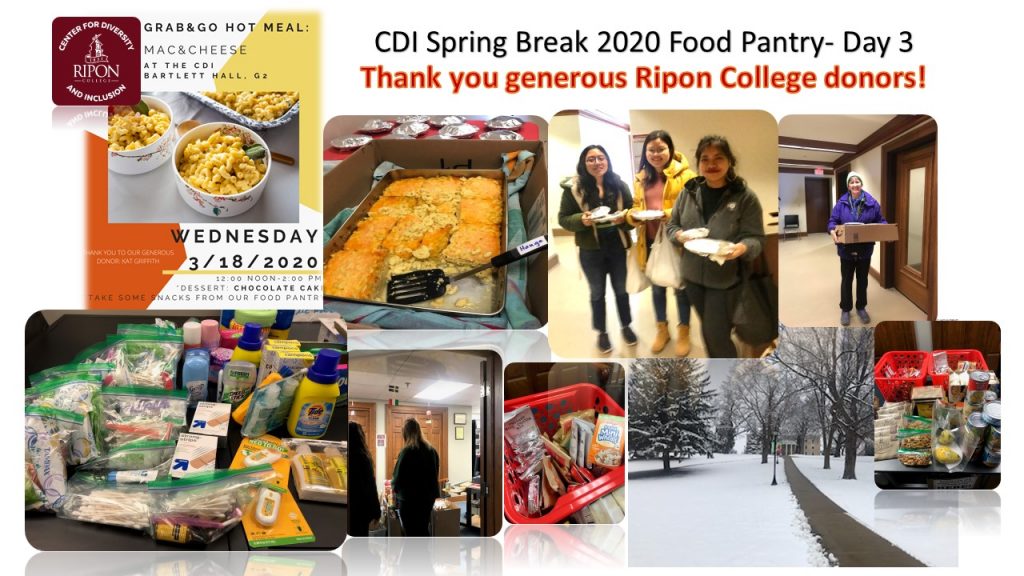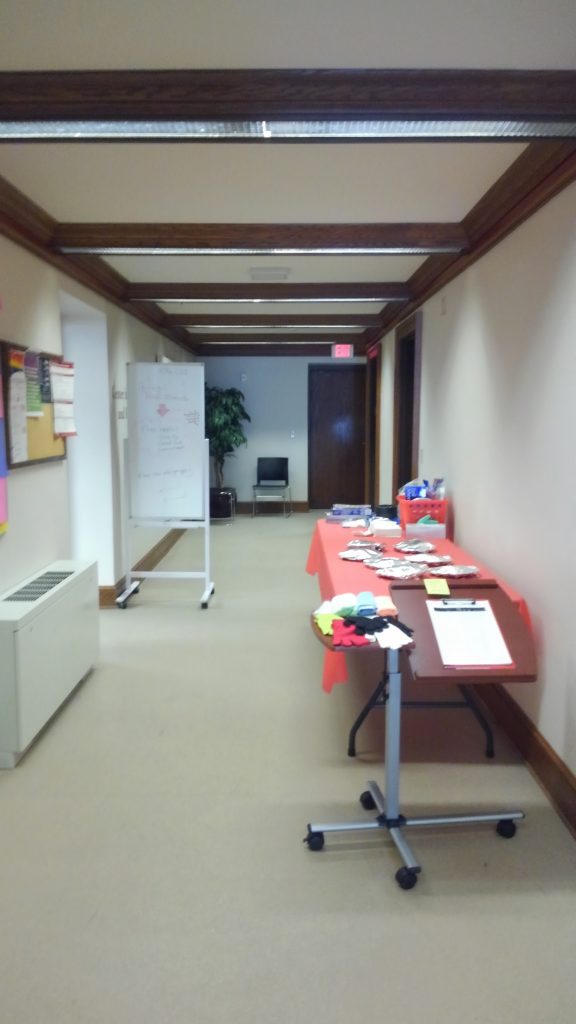By Ripon Media in College Days, Uncategorized on March 25, 2020
Multicultural affairs director says food pantry provides both meals and connections
By Connor Renshaw

A compilation of photos from the food pantry. Image courtesy of Maria Mendoza-Bautista.
Over the first week of Spring Break Director of Multicultural Affairs Maria Mendoza-Bautista turned the main room of the Center for Diversity and Inclusion into a food pantry for students staying on campus. Students were able to pick up food, toiletries and winter gloves that had been donated by members of the college staff and faculty.
While many students go home over Spring Break, Director of Residence Life Mark Nicklaus said that 229 students had applied to stay on campus this year. Because some students were only on campus during certain days, Nicklaus said that there were an average of 137 students on campus at any given time over break.
Mendoza-Bautista cited a desire to look out for the wellbeing of students and a sense of social justice as her motivations for starting the food pantry. “Considering this pandemic, the need for some students to stay on campus, and the need for our students to stay safe and healthy we thought what better than to bring a quick meal that they can just go back to their rooms and prepare?”
“What inspired me was my work in social justice,” she said, “I believe that everybody should have basic needs and that we can mobilize together as a community… Ripon being such a small community does have the capacity to do that.”
Mendoza-Bautista hopes that the experience of having been helped by the food-pantry will help students reflect on the impacts of the COVID-19 pandemic outside of Ripon.
“[We want to] make sure that during these difficult times students are not only going through the motions of what is happening but also thinking on a more global scale. This is something that has now impacted the entire world, our entire nation,” she said. “What are the implications that this has for our own different, diverse, unique communities?
“I’m hoping that through this experience students are able to reflect and do what they can respectively in their own corners of the world, wherever they are going… to me that’s education as a form of social justice.”
Donations to the food pantry came in from on and off campus.
“We’ve connected not only with our campus community, but also our local community. [They] are also part of the donation givers,” she said.

The hallway leading into the Center for Diversity and Inclusion. Hot meals in tinfoil, gloves, and a sign in sheet sit on the table across from a sign welcoming people to the CDI.
Photo courtesy of Connor Renshaw.
Mendoza-Bautista added that the President’s Office also made a donation so that the food pantry could provide hygiene products to students.
On Tuesday, March 17, a campus-wide email was sent out by the Office of the President that said that the majority of college employees would be working from home after the end of the following day. Because of her status as a member of the student life staff, Mendoza-Bautista explained, she would be allowed to continue working on campus and keep the food pantry open.
“As long as students are here, we’ll be here and the center will stay open,” she said. “We hope to continue to collect goods and offer goods on a daily basis.”
While the food pantry was newly implemented during Spring Break, Mendoza-Bautista expressed a desire to keep a similar program running year-round.
“I certainly think this is something that we can have institutionalized so that we can have a mini-pantry all throughout the year,” she said. “All students can know that anytime throughout the day they can come in and grab a small snack as they are running in and out of classes and hopping in and out of buildings to get to their next stop. We hope to be one of those stops for the students.”
In response to the ongoing COVID-19 pandemic, agencies including the Centers for Disease Control and Wisconsin Department of Health Services have advised people to practice social distancing measures, such as limiting contact with others and maintaining six feet of distance between themselves and others. On March 17, Wisconsin Gov. Tony Evers issued a statewide ban on gatherings of more than 10 people. Mendoza-Bautista described running an event that relies on the community while still following social distancing guidelines as “one of the most challenging pieces.”
“We have had to navigate creatively, and we have had to keep in mind that health and safety are first. Social distancing is going to have to be our norm until, atleast, we are given the green light to continue to engage as we normally do,” she said, “I don’t allow any more than three students in here at a time and I make sure that the food pantry is at such a close distance [to the door] that they don’t have to navigate too much in the center to grab their food and go.” Mendoza-Bautista also said that the hours the food pantry was open, 9 a.m. to 6 p.m., were meant to ensure that students had enough time so that they would not all come at once.
As of today, Mendoza-Bautista said, 78 students had visited the food pantry. She pointed out that 18 students currently remain on campus and that “as long as students are here, we will be here for them as a resource.”
Editor’s note: While interviews are often concluded with a handshake, for the sake of social distancing, Mendoza-Bautista and I instead decided to wave. In an email following our interview she said, “The story should not really focus on me but rather the kind hearts of the campus community to support our Ripon scholars during this uncertain time. I could not be able to drive this initiative without the support of the campus and wider Ripon community including President Messitte. Today was a good example of that with the lunch, community support!”


